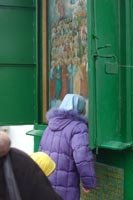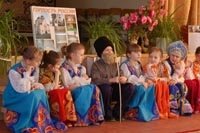“Orthodox atheist”: Education, Religion and Morality in Contemporary Russia
From August 2006 to September 2007 I carried out fieldwork in Rostov-on-Don, the main city of Russian south. The aim of my project was to examine the question of moral and religious (re-)education of today’s Russian society through the educational practices applied both in the state (secular) schools and in the Orthodox parishes (Sunday schools).
Starting point for research
The Soviet state declared it illegal for parents to teach catechism to their children, and established as a substitute ‘communist moral education’, which was one of the core issues of social training of new Soviet people. In the aim to achieve the ideal socialist society, Soviet educators developed and maintained special approach to what they referred to as vospitanie (‘upbringing’, ‘character education’, ‘social training’). The abolition of the system opened the floor for discussion, supposing to help achieve a consensus on new values, common for the entire Russia.

"The Icon - Window on the Kingdom"

Having a bath in the holy spring - an important element of religious socialisation

The old city of Rostov-on-Don and the main church, the cathedral sobor Rozhdestva Presvatoi Bogoroditsy

Religious (re-)education of Russia: parents learn about their "own" religion, accompanying their children attending the Sunday school

Orthodox camps, located near to the monasteries, offer religious instruction for both children and adults

"The pride of Russia": Orthodoxy, tradition and the young generation
After the short period of proclaimed diversity of models of moral education in the now legally pluralistic society, situation changed, and the concept of traditional (i.e. Orthodoxy, Islam, Buddhism, Judaism) and nontraditional confessions was discussed and employed in the preamble of law “On Freedom of Consciousness and on Religious Associations” (O svobode sovestii i o religioznykh ob’edineniiakh) of 1997. The Law created favorable conditions and extended special treatment to the Russian Orthodox Church. Nevertheless, the Constitution proclaiming the separation of Church and state, and still strong anticlericalism voiced in the society, forced the ROC and the most active believers to employ special strategies. The ROC’s recognition of the need for religious (re-)education of the society was possible to execute, even by means of introducing a special, religion-oriented subject in the officially secular school. The subject relates to Orthodoxy, but has been given different names, suggesting its secular content: “The foundations and values of Orthodoxy” (Osnovy i tsennosti pravoslavia), “Bases of Orthodox culture” (Osnovy pravoslavnoi kul’tury), “History of the Orthodox Church” (Istoriia pravoslavnoi tserkvi) etc. The introduction of subject is on the voluntarily basis – in many cases it follows parents’ demand or their or pupils’ accord on the offer from the school’s part. The attempt of introducing such subject was seen as an immediate response to what is perceived in Russia as lack of officially promoted morality or ideology. Also, by many it is viewed as a “cure” for the poor moral condition of society.
In my research I looked at the role of teachers (uchiteli, vospitateli) in the moral and religion-oriented education/upbringing – vospitanie in the contemporary secular school. In detail I was interested in their biographies and their professional careers, especially in the case of those who had received their training in the pre-perestroika era. I was also interested in the issue of acquiring and transmitting religious knowledge in general, a topic researched through participant observation in the Orthodox Sunday school.





